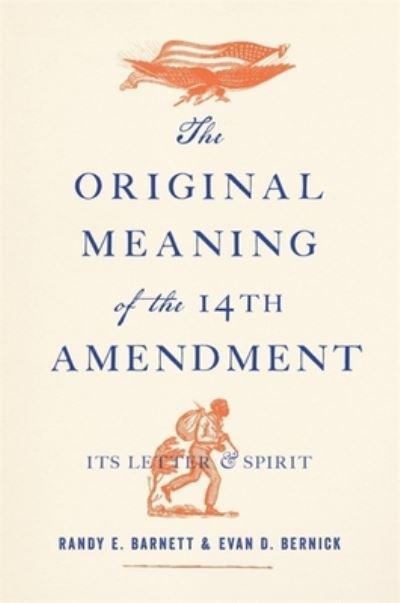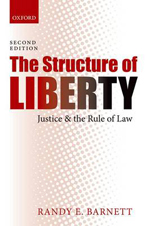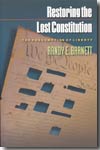The original meaning of the Fourteenth Amendment
its letter and spirit
- ISBN: 9780674257764
- Editorial: The Belknap Press of Harvard University Press
- Fecha de la edición: 2021
- Lugar de la edición: Cambridge (MSS). Estados Unidos de Norteamérica
- Encuadernación: Cartoné
- Medidas: 24 cm
- Nº Pág.: 488
- Idiomas: Inglés

A renowned constitutional scholar and a rising star provide a balanced and definitive analysis of the origins and original meaning of the Fourteenth Amendment.
Adopted in 1868, the Fourteenth Amendment profoundly changed the Constitution, giving the federal judiciary and Congress new powers to protect the fundamental rights of individuals from being violated by the states. Yet, according to Randy Barnett and Evan Bernick, the Supreme Court has long misunderstood or ignored the original meaning of the amendment's key clauses, covering the privileges and immunities of citizenship, due process of law, and the equal protection of the laws.
Barnett and Bernick contend that the Fourteenth Amendment was the culmination of decades of debates about the meaning of the antebellum Constitution. Antislavery advocates advanced arguments informed by natural rights, the Declaration of Independence, and the common law. They also utilized what is today called public-meaning originalism. Although their arguments lost in the courts, the Republican Party was formed to advance an antislavery political agenda, eventually bringing about abolition. Then, when abolition alone proved insufficient to thwart Southern repression and provide for civil equality, the Fourteenth Amendment was enacted. It went beyond abolition to enshrine in the Constitution the concept of Republican citizenship and granted Congress power to protect fundamental rights and ensure equality before the law. Finally, Congress used its powers to pass Reconstruction-era civil rights laws that tell us much about the original scope of the amendment.
With evenhanded attention to primary sources, The Original Meaning of the Fourteenth Amendment shows how the principles of the Declaration eventually came to modify the Constitution and proposes workable doctrines for implementing the key provisions of Section 1 of the Fourteenth Amendment.
Introduction: The Letter and Spirit of the Fourteenth Amendment
I. The Privileges or Immunities of Citizenship Clause
1. The Early Origins of Privileges or Immunities
2. The Antislavery Origins of “Privileges or Immunities”
3. The Antislavery Origins of Republican Citizenship
4. Reconstructing National Citizenship
5. The Letter: Writing and Ratifying the Privileges or Immunities Clause
6. Enforcing Citizenship
7. Competing Originalist Interpretations
8. The Spirit: Implementing the Privileges or Immunities Clause
II. The Due Process of Law Clause
9. The Letter: The Original Meaning of “Due Process of Law”
10. The Spirit: Implementing the Due Process of Law Clause
11. The Proper Ends of Legislative Power
III. The Equal Protection of the Laws Clause
12. The Letter: The “Equal Protection of the Laws”
13. The Spirit: Implementing the Equal Protection of the Laws
Conclusion: The Fourteenth Amendment in Full
Notes
Acknowledgments
Index
Foreword by James Oakes.








